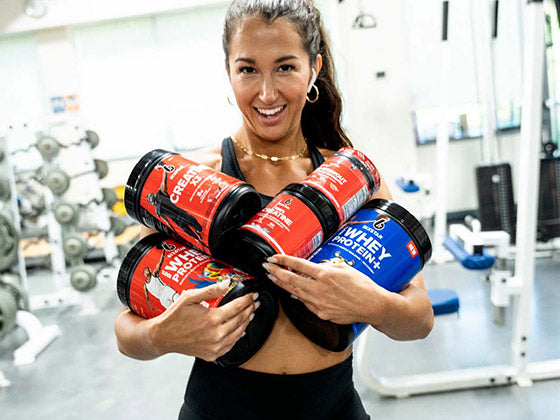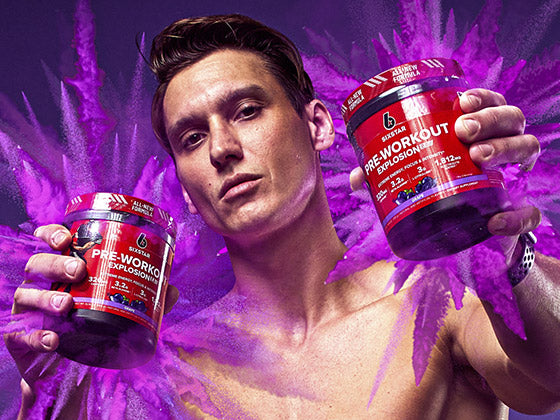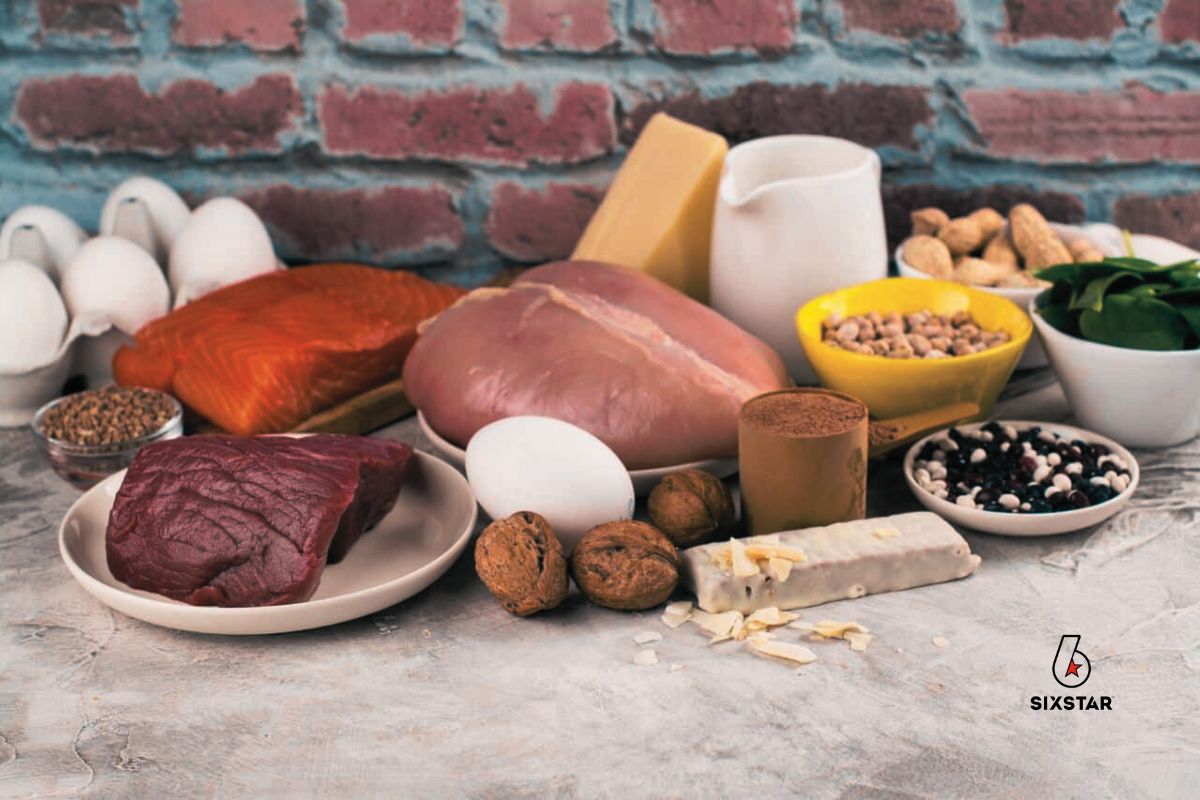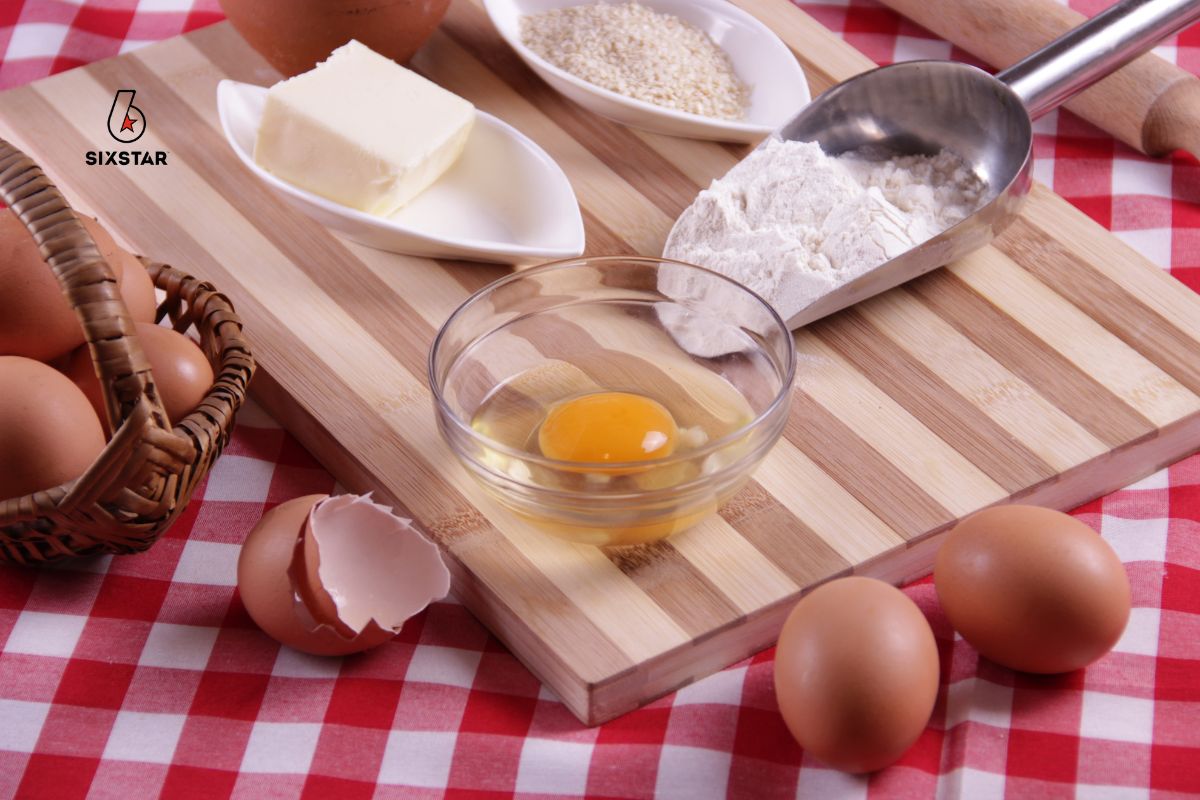Looking for nutrient-rich foods is crucial when you try to live a healthy lifestyle. One of the nutrients you need for good nutrition and health is leucine - an amino acid important for regulating blood sugar levels and muscle health. That is why so many athletes have included foods high in leucine in their diets.
If you want to elevate your nutrition, eating foods rich in leucine might be one step towards your goal. In this blog, we have explained everything about this amino acid and its benefits. Moreover, we have included what foods contain leucine so that you will know what may be beneficial for your diet.
Table of contents
What Is Leucine?
Leucine is one of the branched-chain amino acids (BCAAs), along with valine and isoleucine, and it plays a key role in repairing and building muscle. It is particularly beneficial for older adults, as getting enough leucine might help prevent muscle loss. However, it is also very popular among bodybuilders because it helps with muscle health.
Another interesting thing about leucine is that it may help manage blood sugar levels. It is said to do this by aiding glucose uptake in your cells and improving how your body responds to insulin. So, even if you do not have particular body goals, it might be beneficial to intake this amino acid daily.
For most adults, the recommended leucine amount is about 25 mg per pound of body weight, or around 4.4 grams per day for someone who weighs 175 pounds. Nonetheless, recent guidelines from the World Health Organization suggest that healthy adults should aim for about 18 mg of leucine per pound, or roughly 3.1 grams per day for that same 175-pound person.
If you intend to monitor the amount of your leucine intake, you should stick to the recommendations. This is the best way to ensure you will obtain the desired result.
Why Is Leucine Important?
Leucine is known for its fantastic ability to boost protein synthesis in our muscles, which is key for building and repairing muscle tissue. Recent research has also shed light on how it helps with things like mitochondrial growth and the energy production process in muscle cells.
So, adding more foods high in leucine to your meals can really kick up muscle protein synthesis and improve your overall health. There are lots of options, whether you go for animal products or plant-based sources. This means it is easy to get enough of this essential amino acid. Plus, the benefits of leucine go beyond just muscle health.
Some studies suggest it can help make tumors less aggressive and decrease their spread. So, a well-rounded diet that includes plenty of leucine can be great for both muscle growth and your overall health.
If you are determined to take your health to the next level, you will want to know which foods are rich in leucine. Understanding where leucine is present is essential when you want to create a well-balanced and healthy diet.
Which Foods Contain Leucine?
Leucine is present in many foods that you may regularly consume. However, if you want to be in control of your diet and the nutrients you take daily, you will need to learn what kind of ingredients your meals include. To make things easier for you, we have made a list of foods high in leucine, so you can plan them for your meals.
1. Cottage Cheese
A 1/2-cup serving of 1% fat cottage cheese, which is about 100 grams, packs in 1.27 grams of leucine. It is not just about the leucine. Namely, cottage cheese is also a solid source of protein, selenium, and vitamin B12. Because of its high protein levels, this food can help with weight loss by keeping you feeling full longer. Plus, if you pair it with some resistance training, it can aid in building muscle mass.
The great thing is that you can enjoy cottage cheese in so many ways! Try topping it with berries and nuts for a hearty breakfast or mix it up in stuffed pasta shells or lasagna. You can have it as a great side dish with almost any meal. It even works as a healthier alternative to mayonnaise in things like sandwiches!
What is more, it is a great alternative for vegans and vegetarians. Since these people do not consume meat, cottage cheese is a great option for nutritious meals.
2. Meat
Meat and poultry are great sources of leucine, with chicken breast, beef, and turkey being particularly rich in this essential amino acid.
For instance, chicken breast offers about 2.5g of leucine and 32g of protein per 100g, all for just 165 calories. It is also packed with other important nutrients like iron and vitamin B6. Moreover, turkey is similar, providing around 2g of leucine and 34g of protein at only 147 calories. It is a lean protein option with good amounts of B vitamins.
Lastly, beef is another excellent choice, containing 2.6g of leucine and 30g of protein per 100g, all while being low in calories at 122. Plus, it is rich in B12 and iron, which are vital for energy.
So, if you like meat, you have different options that will provide you with many nutrients. Including various types of meat in your diet will ensure you have a high-quality meal. But it will also make your diet versatile, so you will not get bored with your eating choices.
3. Eggs
Eggs are super versatile and packed with nutrients. They are a great natural source of leucine and high-quality protein. Plus, they come with plenty of essential nutrients like vitamin D and choline.
Just one extra-large egg - about 56 grams - offers around 0.6 grams of leucine. Eggs are abundant in protein, B vitamins, selenium, choline, and phosphorus. All of these are important for our cell and brain health, so including eggs in your diet is crucial.
They also contain lutein and zeaxanthin, two types of carotenoids that have antioxidant properties good for our eyesight. Boiled eggs make for a fantastic, portable, high-protein snack. You can whip them into a breakfast scramble or incorporate them into baked treats like bread, muffins, and waffles.
As you can see, eggs can be combined with many things. This means that they can be included in any type of meal. It does not matter if it is breakfast, dinner, or dessert. You just have to find your preferred way, and you will elevate your diet!
4. Sesame Seeds
Believe it or not, two tablespoons of dried sesame seeds pack 0.25 grams of leucine. Aside from being foods high in leucine, they are loaded with fiber, protein, manganese, calcium, magnesium, zinc, and B vitamins. Plus, these little seeds have plant compounds that studies have found might help with inflammation, lowering cholesterol levels, and blood sugar management.
The best thing is that you can toss sesame seeds into stir-fries, pasta, or smoothies. Moreover, you can add them to green salads too. If you are feeling adventurous, try sesame seed butter, also known as tahini! There are plenty of options to consume sesame seeds. You just need to find your preferred one and add it to your daily meals!
5. Salmon
If you are not a fan of meat, like chicken or beef, you may want to consider fish. Fish is known to be very nutritious, especially if you choose specific types, such as salmon.
For every 100 grams, you will find 2 grams of leucine and 23 grams of protein, along with about 205 calories. Salmon is known for being an oily fish packed with omega-3s, which are great for your health.
These healthy fats can support heart health and even boost your mood and memory. Plus, salmon is loaded with nutrients like selenium, potassium, B vitamins, and phosphorus. And it is one of the few foods that provide vitamin D. So, if you want food that is packed with numerous nutrients, this is your perfect option!
6. Canned Navy Beans
A 1/3-cup serving of canned navy beans, which is about 100 grams, has around 0.7 grams of leucine. These beans come with not just protein and fiber, but also essential vitamins and minerals like folate, B vitamins, iron, magnesium, phosphorus, manganese, and potassium.
Research shows that eating navy beans can help protect your heart and improve various health risks linked to obesity, such as high blood pressure, cholesterol levels, and blood sugar. Plus, they contain a compound called phosphatidylserine, which may support brain health by enhancing memory, focus, and communication skills.
Navy beans have a mild flavor that makes them versatile for all sorts of meals. To get the most out of them, you can add them to soups or toss them in salads. However, you can also serve them as a marinated side dish or mash them up into a tasty white bean dip. You have a lot of options, so it is up to you to decide how to include them in your meals.
7. Parmesan Cheese
We mentioned cottage cheese, but we should not forget the amazing properties of parmesan. People who love eating cheese will enjoy including various types of it in their meals.
In every 100 grams of Parmesan cheese, you will find about 3.4 grams of leucine and a solid 35.8 grams of protein, amounting to 392 calories. Parmesan is definitely rich in protein and leucine, but it is also fairly high in calories, fat, and salt.
So, it is important to watch your portion sizes if you want to keep a healthy diet. Like many dairy products, parmesan is also a great calcium source, which is really important for keeping your teeth and bones healthy! In short, if you are a fan of cheese, especially parmesan, we encourage you to add this food rich in leucine to your diet. However, be careful with the amount you include to ensure you are staying within the limits of healthy food!
8. Pumpkin Seeds
Did you know that just about 28 grams of dried pumpkin seeds have around 0.7 grams of leucine? And, they are not just high in leucine! Pumpkin seeds are also loaded with plant compounds that are great for your health.
Plus, they are a fantastic source of nutrients like protein, fiber, healthy fats, phosphorus, magnesium, manganese, iron, copper, and zinc. So, when you want food that will bring you numerous benefits in relation to nutrition, pumpkin seeds should be your choice!
That is, regularly munching on seeds can really support your heart health, primarily thanks to the good fats they contain. You can enjoy pumpkin seeds on their own or mix them with other seeds like chia, hemp, flax, sesame, and sunflower seeds for a tasty snack.
Pumpkin seeds are super versatile, too. You can roast and season them for a crunchy treat, toss them into granola or trail mix, or blend them into a flavorful pesto. You can even sprinkle them into your baked goods like bread and cookies.
9. Pine Nuts
When you look at the properties of pine nuts, you will see numerous benefits in terms of nutrition. For every 100 grams, they have about 2 grams of leucine and 14 grams of protein, along with a calorie count of 693.
Since they are high in saturated fat and calories, it is a good idea to keep an eye on portion sizes. A common serving size is around 25 grams, which gives you about 3.4 grams of protein and 173 calories. Plus, pine nuts are a great source of vitamin E, which is really important for keeping your eyes and skin healthy and boosting your immune system.
Over to You
If you want to improve your diet and take advantage of different kinds of food nutrients, then you need to consider foods high in leucine. This amino acid is found in many foods, so you will easily find your favorites. Just make sure to consider recommendations when it comes to consumption amounts so that you ensure your diet is healthy!



